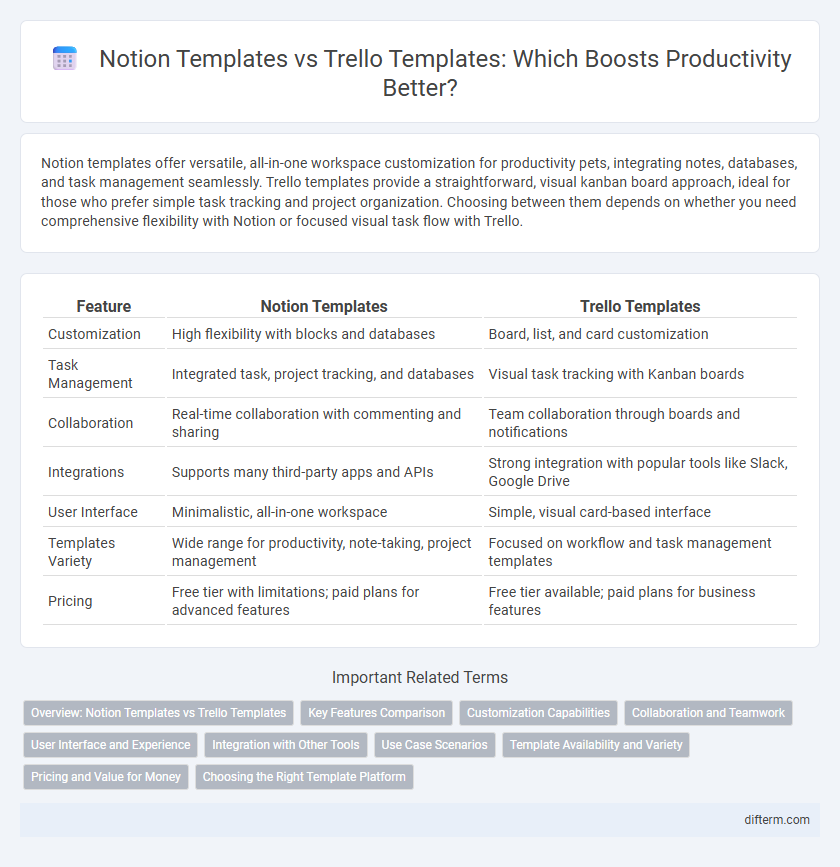Notion templates offer versatile, all-in-one workspace customization for productivity pets, integrating notes, databases, and task management seamlessly. Trello templates provide a straightforward, visual kanban board approach, ideal for those who prefer simple task tracking and project organization. Choosing between them depends on whether you need comprehensive flexibility with Notion or focused visual task flow with Trello.
Table of Comparison
| Feature | Notion Templates | Trello Templates |
|---|---|---|
| Customization | High flexibility with blocks and databases | Board, list, and card customization |
| Task Management | Integrated task, project tracking, and databases | Visual task tracking with Kanban boards |
| Collaboration | Real-time collaboration with commenting and sharing | Team collaboration through boards and notifications |
| Integrations | Supports many third-party apps and APIs | Strong integration with popular tools like Slack, Google Drive |
| User Interface | Minimalistic, all-in-one workspace | Simple, visual card-based interface |
| Templates Variety | Wide range for productivity, note-taking, project management | Focused on workflow and task management templates |
| Pricing | Free tier with limitations; paid plans for advanced features | Free tier available; paid plans for business features |
Overview: Notion Templates vs Trello Templates
Notion templates offer versatile, all-in-one workspace solutions combining notes, databases, and task management, ideal for comprehensive project organization and knowledge management. Trello templates focus on visual task tracking through flexible, card-based Kanban boards, enhancing team collaboration and workflow clarity. Both platforms optimize productivity but cater to different user needs: Notion excels in customizable content creation, while Trello excels in streamlined project and task visualization.
Key Features Comparison
Notion templates offer all-in-one workspace customization with database integration, rich media support, and hierarchical organization, ideal for complex project management and note-taking. Trello templates excel in visual task tracking through its kanban board system, featuring drag-and-drop cards, customizable workflows, and automation with Butler for streamlined team collaboration. Both platforms provide collaboration tools but differ in focus: Notion emphasizes versatility and content creation, while Trello prioritizes straightforward task visualization and workflow automation.
Customization Capabilities
Notion templates offer extensive customization capabilities, allowing users to create highly personalized workflows with nested pages, databases, and varied content blocks. Trello templates focus on card-based project management with limited customization mainly around labels, checklists, and Power-Ups integrations. For users seeking deep customization tailored to complex productivity needs, Notion templates provide more flexibility and granular control compared to Trello's simpler board structures.
Collaboration and Teamwork
Notion templates offer robust collaboration features with customizable databases, real-time editing, and integrated comments that streamline teamwork and project management. Trello templates excel in visual task tracking with intuitive Kanban boards, enabling teams to quickly adjust workflows and monitor progress through shared cards and activity logs. Both platforms enhance productivity by fostering transparent communication, but Notion's versatility suits complex projects while Trello's simplicity drives agile collaboration.
User Interface and Experience
Notion templates offer a highly customizable user interface with nested pages and rich content blocks, enabling users to tailor workflows extensively for enhanced productivity. Trello templates feature a straightforward, card-based UI that emphasizes visual task management and quick drag-and-drop interactions, ideal for users seeking simplicity and speed. User experience in Notion leans towards depth and flexibility, while Trello excels in intuitive project overview and collaboration efficiency.
Integration with Other Tools
Notion templates offer extensive integration with tools like Slack, Google Drive, and Zapier, enabling seamless automation and centralized workflows. Trello templates support integrations through Power-Ups, connecting with applications such as Jira, Salesforce, and Microsoft Teams to enhance project tracking. Notion's native database capabilities provide deeper customization for syncing data across platforms compared to Trello's more task-oriented approach.
Use Case Scenarios
Notion templates excel in complex project management and knowledge organization due to their customizable databases and integrated note-taking features, making them ideal for detailed workflows and content-heavy projects. Trello templates offer a more visual, card-based interface that suits simple task tracking, agile workflows, and team collaboration with quick overviews. Choosing between Notion and Trello templates depends on the need for depth in data management versus ease of use for straightforward task sequencing.
Template Availability and Variety
Notion offers a vast selection of customizable templates across categories like project management, personal planning, and content creation, catering to diverse productivity needs. Trello provides numerous visually intuitive board templates primarily focused on task and workflow management, emphasizing simplicity and collaboration. Both platforms maintain active template communities, but Notion's library excels in variety and adaptability for complex productivity setups.
Pricing and Value for Money
Notion templates offer a wide range of customizable features at various pricing tiers, including a free plan with essential tools and a paid plan starting at $8 per user per month for enhanced collaboration and advanced functionality. Trello templates are available within its free plan, but unlocking premium templates and integrations requires a Business Class plan at $12.50 per user per month, which offers more automation and priority support. Notion generally provides better value for money for users prioritizing comprehensive customization and all-in-one workspace management, while Trello's pricing caters to teams focused on streamlined task tracking with robust automation.
Choosing the Right Template Platform
Notion templates offer versatile, all-in-one workspace customization ideal for users seeking integrated note-taking, databases, and project management, while Trello templates provide a streamlined, card-based Kanban system suitable for straightforward task tracking. Selecting the right template platform depends on the complexity of your workflow; Notion excels in handling multifaceted projects with detailed documentation, whereas Trello simplifies visual task organization and team collaboration. Prioritize platform scalability, task interconnectivity, and user interface preferences to maximize productivity with your chosen template.
Notion templates vs Trello templates Infographic

 difterm.com
difterm.com